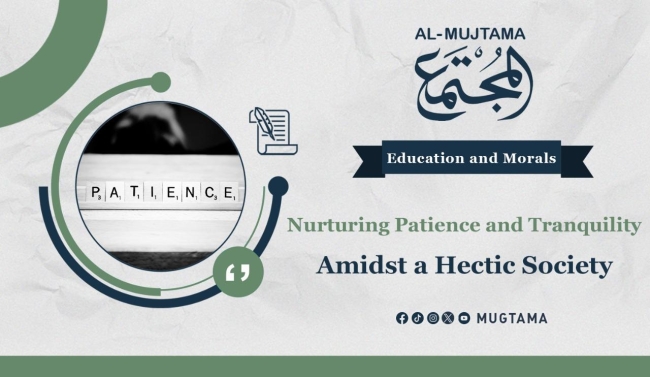Nurturing Patience and Tranquility Amidst a Hectic Society
In today’s fast-paced world, patience and calm have become skills that are nearly extinct. We live in a time when desires can be instantly gratified, reinforcing the concept of immediate satisfaction. Given the rapid pace at which the world moves, developing patience and the ability to wait is no longer just a matter of virtue; it has become essential for professional success and mental well-being. Hence, raising the next generations with a foundation in patience and calm is a vital and fundamental task that we must focus on to help build balanced societies and strong, resilient minds capable of enduring hardships.
The Meaning and Importance of Patience in Islam
Patience holds a central place in Islam, signifying acceptance and submission to the will of Allah. It is mentioned in numerous Quranic verses and Prophetic hadiths. Allah Almighty says: "And seek help through patience and prayer." (Al-Baqarah: 45). He also says: "O you who have believed, persevere and endure and remain stationed" (Aal Imran: 200), and "Indeed, Allah is with the patient." (Al-Baqarah: 153). These verses indicate that patience is not merely a personal virtue but an obligation upon every Muslim, necessary for their success in this life and the Hereafter.
A truly patient person restrains their desires from controlling his actions, reaching a state of acceptance and submission to Allah’s will. They may even reach a higher level, viewing trials as blessings, not afflictions, and giving thanks to Allah for them. This leads them to be thankful, patient, and content, considering trials as a path to reward, one of the highest levels of faith.
Reasons for the Lack of Patience and Calm in the Modern Era
- Technology and Speed: With the widespread availability of smart devices and social media, people have grown accustomed to obtaining everything at lightning speed, diminishing their ability to wait or remain calm.
- Social Pressures: Modern life, with its social obligations and economic pressures, has made individuals more stressed and less patient in dealing with those around them.
- Weak Family Bonds: Modern families often lack calm dialogue and patience in raising children, making children less resilient and more prone to impatience.
A recent study published in Mental Health Science found that stress plays a major role in young adults feeling older than their actual age on days that are particularly stressful or when they feel a lack of control in their lives. Another study has shown that patience helps enhance resilience and raises levels of psychological flexibility, which are essential skills for successfully facing life’s challenges. A study published by the American Psychological Association confirmed that patient individuals enjoy better mental health and are more capable of achieving their personal and professional goals in a positive way.
Practical Steps for Nurturing Patience in Oneself and Children
- Instilling Religious Values: It is essential that children learn the importance of patience as part of their faith from an early age. The life of the Prophet and his companions offers many examples of patience and wisdom, such as the saying of the Prophet ﷺ: "Patience is illumination." (Sahih Muslim). Thus, children grow up with these noble values.
- Training in Waiting: One effective way to cultivate patience and calmness in children is by teaching them to wait and exercise moderation in their desires. For example, parents can delay certain rewards to teach children how to wait for results positively.
- Encouraging Positive Dialogue: Dialogue between parents and children is an effective way to convey the concept of calmness. Parents can help children develop problem-solving skills and manage emotions without rushing.
- Reducing Excessive Pressures: Minimizing excessive pressures and reducing daily activities can foster a calm environment for children.
- Encouraging Meditation and Reflection: Recent research suggests that practicing meditation can help individuals calm their minds, increase focus, and enhance patience. It is recommended to introduce activities that require focus and patience, like reading or drawing, to strengthen these abilities in children.
As the saying goes, “Learning in youth is like engraving on stone.” But how can a person discipline themselves and develop patience as an adult? In this regard, Dr. Khalid Al-Mutawa, a family and educational expert, suggests several methods for nurturing patience, including for both adults and children:
- Expressing Emotions: Teaching children and adults to express their distress through talking and sharing feelings, as well as through artistic activities like drawing and writing, or physical activities like walking and swimming.
- Relying on Supplication and Prayer: Such as the supplication of the people of Talut, "Our Lord, pour upon us patience" and benefiting from prayer, as Allah says: "And seek help through patience and prayer" (Al-Baqarah: 45).
- Seeking Support from Others: Sharing feelings with friends or family members to relieve distress.
- Trusting in Allah’s Decree: Believing that Allah’s decree is good, which strengthens the soul and increases resilience.
- Focusing on the Bigger Picture: Focusing on life’s blessings, like health and family, instead of the negative details.
- Remembering the Reward of Patience: Knowing that Allah is with the patient, and their reward is limitless.
- Reflecting on Allah’s Name "Al-Saboor": To embody patience and balance in life.
-------------------------------------------------------------
Sources:
- Official website of Dr. Jassim Al-Mutawa
- "Methods of Education in the Quran - Patience" Article published on the website of the World Islamic Council for Call and Relief
- "The Art of Developing Patience in a Fast-Paced World" Article published on Goldvarg (Coaching)
- Study published on Al- Asharq Al-Awsat newspaper website
- Imam Ibn Baz website
- Planet of Kidz website


